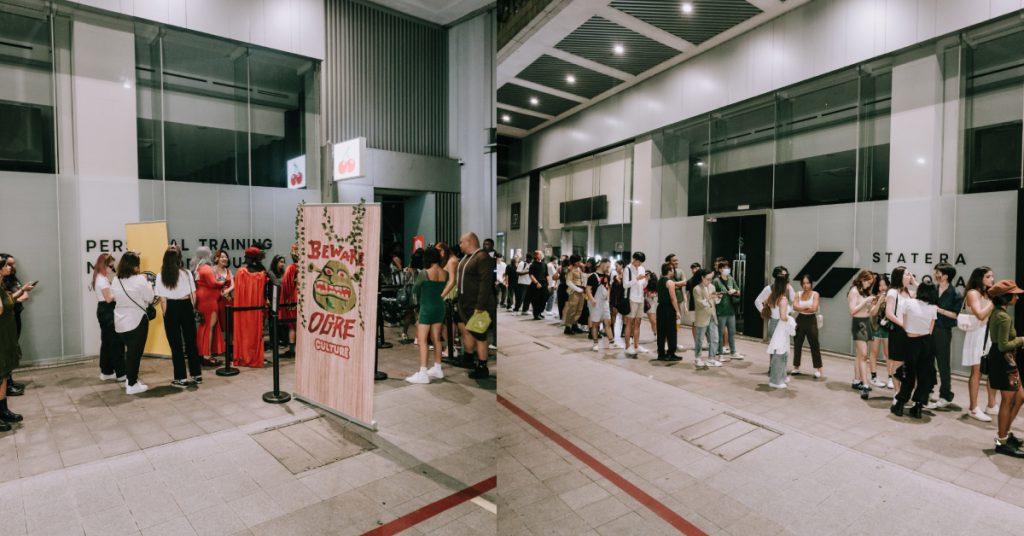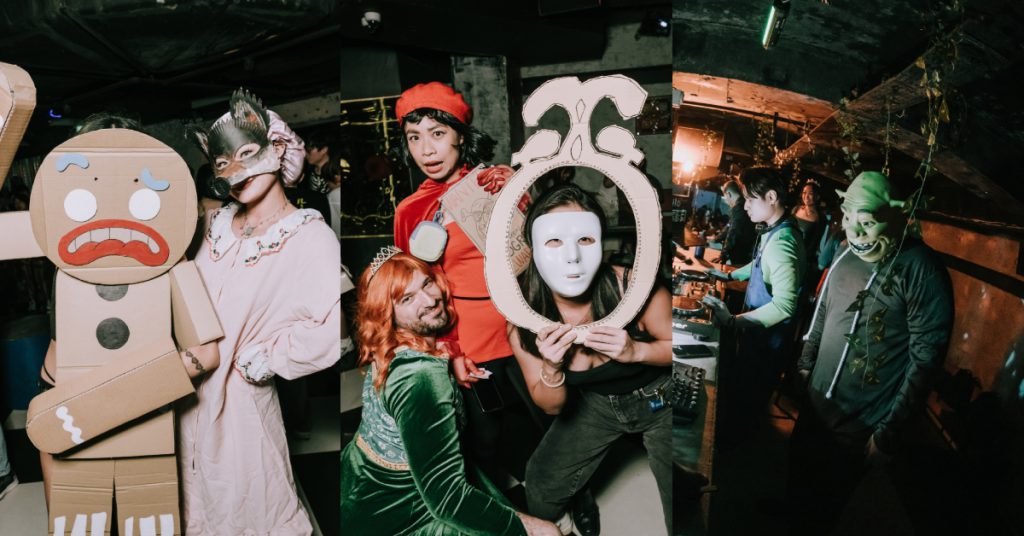How this S’porean DJ trio is revitalising the local club scene with wacky themed parties
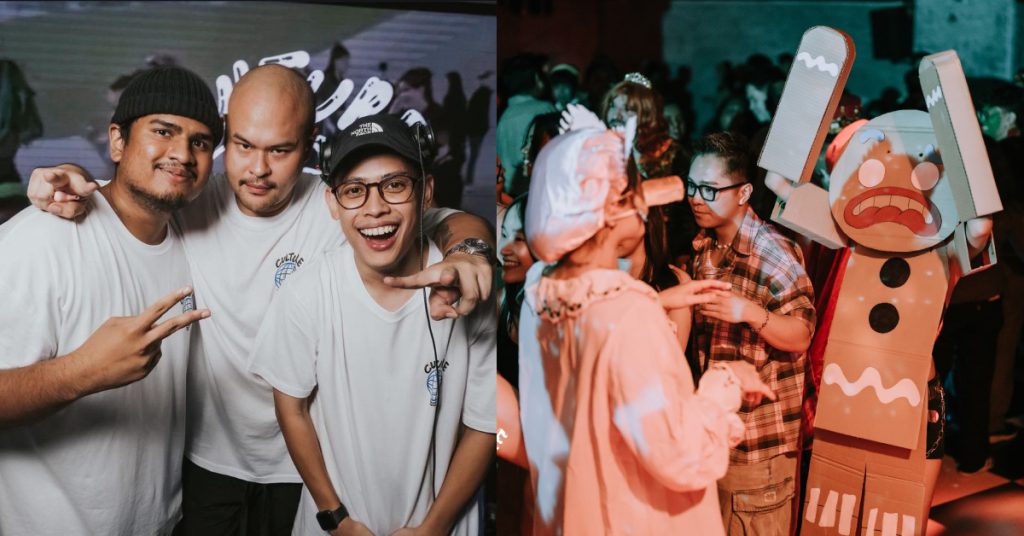
Loud pounding music, strobing lights, and sweaty bodies that reeked of alcohol—that scene is what many of you might envision when clubbing is mentioned.
While we agree that some enjoy it, not everyone can appreciate the same EDM tracks and Spotify Top 40 hits, including Singaporean DJ trio, Vira Suria, Ashraf “Ash” Karim, and Ahmed “Fai” Faizal, who are also founders of Culture SG.
According to the founders, Culture SG was formed in response to the local clubbing scene becoming “stagnant”—with the same concepts being recycled and the lack of “fresh” ideas.
“Most venue owners and promoters seemed to be playing it safe, sticking to tried-and-true formulas that guaranteed steady earnings but didn’t push any boundaries,” said Vira.
That’s when they had their “a-ha” moment. The trio saw a “hunger” among clubgoers for a more curated and elevated experience from the typical clubbing scenarios. So, they took up the opportunity by introducing new music genres and immersive themed nights, and hopefully, fostering a stronger sense of community.
To revitalise the local clubbing scene, all three founders collectively invested around S$6,500 of startup capital, and Culture SG was born in 2021.
Starting their business during the pandemic

However, they were in the midst of the COVID-19 pandemic, when many clubs in Singapore shut down due to financial constraints.
The circumstances forced many DJs to seek alternative sources of income, pivoting to online and livestream gigs to continue connecting with their audiences and practise their craft.
Despite their efforts, it often did not compensate for their losses from the lack of in-person events, as the digital space was becoming saturated quickly, making it difficult to stand out and monetise effectively.
To support themselves, all three founders took on part-time jobs in other sectors—a major change in their routine as they had to balance new work responsibilities while refining their DJ skills.
The uncertainty of when measures would be lifted and when we could return to normal operations added another layer of stress. It required us to constantly adapt our plans and expectations, all while trying to stay motivated and relevant in a rapidly changing landscape.
Ashraf “Ash” Karim, co-founder of Culture SG
Despite these challenges, this period also pushed them to innovate and hone their skills, eventually changing their approach to running the business.
Catering to a “lost generation” of clubbers
Due to the COVID-19 pandemic, many were not able to experience the clubs when they hit 18 years old, and hence, were looking for fresh, exciting experiences to make up for “lost time”—a gap that did not go unnoticed by Culture SG.
To establish themselves as “the go-to destination for unique, trend-driven nightlife experiences”, the founders made several changes to the business, starting with their themed parties.
Audience involvement is a pillar of Culture SG’s business, as the team looks to their requests and the latest trends to decide the theme of their parties so they can create memorable, high-quality experiences that resonate with people.
However, there were instances where people classified them as another party organiser or DJ collective that solely held themed parties, which, according to the founders, was only a fraction of what the company offered.
While themed events are indeed part of our repertoire, we quickly realised we needed to better communicate the full range of our services.
We’re not just about creating unique nightlife experiences—we also provide comprehensive event solutions and marketing services for established corporate companies.
Ahmed “Fai” Faizal, co-founder of Culture SG
The trio also made the conscious decision to bootstrap the business, allowing them to retain full control of their vision and direction from the get-go. Yet, they have also struggled to fund their events, pushing them to be strategic with how their limited capital is used.
When asked about Culture SG’s monetisation model, Vira explained that the business leverages two key areas to diversify its income: direct consumer sales (i.e. ticket and merchandise sales) and B2B services (i.e. event solutions, events and marketing partnerships).
He also acknowledged that financial challenges are common in the events industry, but with a robust model, the business can adapt to market changes and capitalise on their expertise in the sector.
To educate people about what Culture SG truly brings to the local party scene and beyond, the team employed several strategies, such as creating behind-the-scenes content on social media.
Moving to bigger and, maybe, better things
Since its inception and the lifting of social distancing measures, Culture SG’s parties became extremely popular among the younger generation of clubbers, with tickets selling out within minutes upon release.
The founders shared that they were able to expand the B2B side of the business and organised larger scale events. Notably, the company collaborated with global creator and entertainment company Gushcloud for MOOD:LIVE, which was touted as Singapore’s largest hip-hop festival.
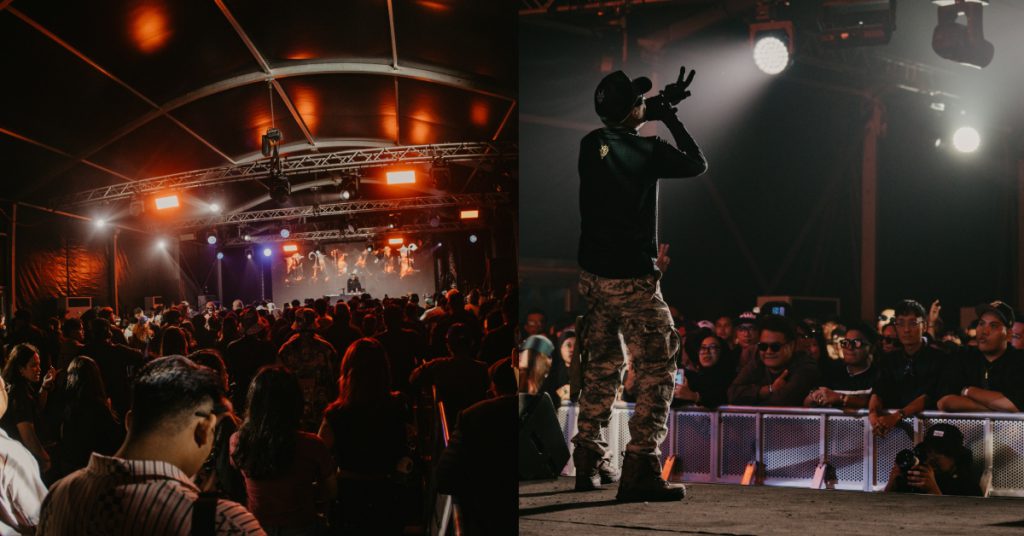
Currently, the team is hosting weekly events with their second edition of Neighbourhood Desk Tunes, a party that spotlights local artists at Kim San Leng Coffeeshop locations.
Moving forward, all three founders have expressed that they aim to double down on maintaining their niche in the local club scene.
As to how they plan to do so? Sad to share that their lips remain sealed… for now.
Embark on your startup journey with MAS-regulated ANEXT Bank, one of Singapore’s first digital banks for SMEs.
Also Read: AI bartender? Creatives behind USS to launch “S’pore’s first AI-powered futuristic nightclub”
Featured Image Credit: Culture SG
Singapore job market in Q2 2024: Retrenchments rise, but employment doubles

The second quarter of 2024 saw an interesting mix of trends in the Singapore job market.
While retrenchment was up compared to the first quarter, total employment also saw significant growth, showing resilience despite challenges.
Let’s break it down.
An uptick, but still lower than 2023
In the second quarter of 2024, 3,270 people were retrenched, a slight increase from the 3,030 in Q1. However, it’s worth noting that this number is still lower than the 3,820 retrenchments recorded in the first quarter of 2023, Mothership reported.
This rise was expected, with some major multinational companies (MNCs) like Dyson making the news for layoffs. On October 1, Dyson let go of workers in Singapore, citing internal reasons.
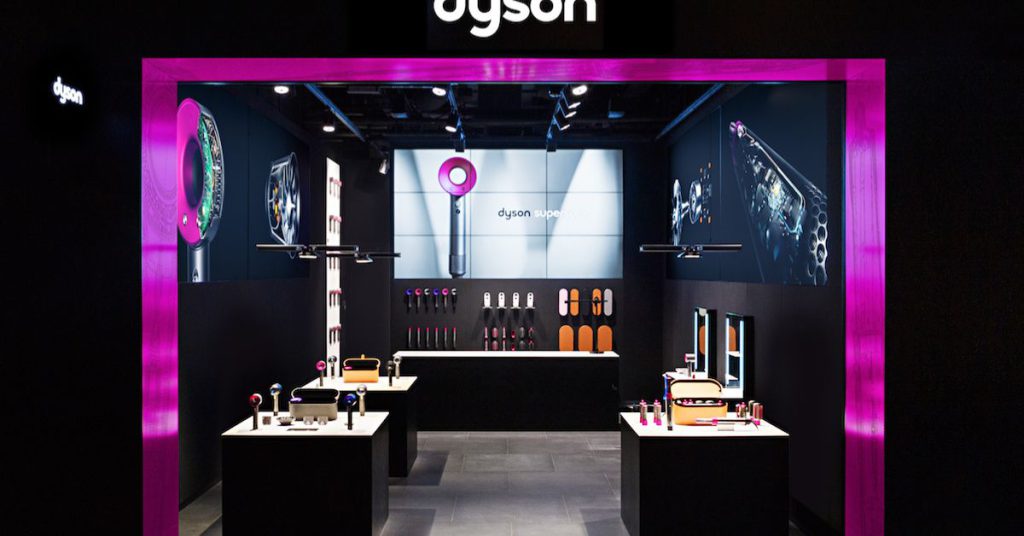
Despite this, Dyson managed to stay within legal requirements, informing the Ministry of Manpower (MOM) within the five-day notice period, although unions felt the communication could have been better.
Not only that, according to a Bloomberg report, Samsung also started a retrenchment exercise on October 1.
Still, even with more retrenchments this quarter, a positive sign emerged—more than half of those retrenched were able to secure jobs within six months. That’s a silver lining for many workers who are quickly bouncing back into the workforce.
Even as retrenchments edged up, total employment in Singapore grew by a solid 11,300 in the second quarter of 2024. This is more than double the employment growth seen in Q1, which only added 4,700 jobs.
It’s clear that while some companies are downsizing, others are expanding and hiring, driving overall job creation.
Why are companies retrenching?
So, why are some companies retrenching while others are hiring? Mothership reported that according to Deputy Prime Minister (DPM) and Minister for Trade and Industry Gan Kim Yong, several factors contribute to these retrenchments.
Market dynamics play a big role—when certain products or services aren’t performing well, companies have to make tough decisions, said DPM Gan in a written reply.
On top of that, MNCs often restructure globally, which can lead to downsizing in certain regions, including Singapore.

In these situations, the government works closely with both companies and unions to support retrenched workers, offering skills training and helping them find new job opportunities. The quick reemployment of many retrenched workers shows that these measures are working.
Singapore’s investment appeal remains strong
Despite the retrenchments, Singapore is still an attractive destination for foreign investments.
According to the Mothership article, the Economic Development Board (EDB) has already secured S$5.4 billion in fixed asset investment (FAI) commitments in the first half of 2024. These investments, which include capital going into new facilities, machinery, and infrastructure, are expected to provide long-term job opportunities.
Big names like Amazon Web Services (AWS) are planning further investments. AWS will inject an additional S$12 billion into cloud infrastructure projects over the next four years.
Meanwhile, pharmaceutical giant AstraZeneca is setting up a massive S$2 billion facility to produce cutting-edge antibody-drug conjugates. These investments will not only create jobs but also position Singapore as a hub for innovation in tech and pharma.
Foreign-owned companies remain a significant part of Singapore’s economy. Although they make up only about 20% of all firms, they provide nearly a third of the jobs for residents.
They are also key players when it comes to high-paying positions, with around 60% of locals earning more than S$12,500 a month working for these companies.
-//-
While retrenchments are never easy, the bigger picture is promising. Employment is growing and foreign investments are flowing into Singapore, creating opportunities for locals.
With continued government support, workers who do face retrenchment can look forward to bouncing back and landing on their feet. And with major investments on the horizon, Singapore’s economy seems well-poised for future growth, even amid global uncertainties.
Also Read: SDEC 2024 will explore the latest trends in semicon, AI & ecommerce, here’s how to join
Featured Image Credit: iStock
Confused about the new deepfake ban ahead of Singapore’s GE? Here’s a breakdown.

The Singapore government has introduced a new law in a bid to prevent the dissemination of false digital depictions of election candidates, ensuring the truthfulness of their representation and protecting the integrity of the country’s elections.
The new law comes ahead of Singapore’s upcoming general election, which must be held by November 2025.
Digital Development and Information Minister Josephine Teo announced the legislation, known as the Elections (Integrity of Online Advertising) (Amendment) Bill, or ELIONA, which was passed yesterday (October 15) in parliament.
According to an article by The Business Times, Minister Teo stated that the law amends Singapore’s election legislation and will address “the most harmful types” of elections-related content, which misleads or deceives through a “realistic enough” false representation of a candidate’s speech or actions.
There are different caveats and conditions to the new law; here’s a breakdown:
What type of content will be banned?
Content will be banned if it meets four criteria:
- Being or including online election advertising
- Digitally altered
- Depicts an untrue representation
- Appears realistic enough for some members of the public to believe it
This includes content altered with artificial intelligence (AI), as well as “more traditional” methods like Photoshop, dubbing, and splicing.
Minister Teo referenced a recent study by Verian in her speech, which showed that more than six in 10 Singaporeans are concerned about deepfakes influencing the next election.
What will not be banned?
On the other hand, ELIONA will not apply to the following:
- Unrealistic characters
- Cartoons
- Beauty filters
- Memes
- Satire
- Campaign posters that are unrealistic
However, Minister Teo clarified that labelling manipulated content won’t automatically exempt it from prohibition, as labels can be removed or unnoticed, and there are ways to remove it before recirculation.
Whether the content favours a candidate or not is irrelevant. In the case of this legislation, publication includes boosting, sharing, and reposting. However, the law will provide a defence for those who inadvertently commit the offence.
Sharing content privately and in closed groups is not covered under the law, but dissemination of such content in large public chat groups on platforms like WhatsApp and Telegram is subject to it. In such cases, the government will assess if action should be taken.
The prohibition does not apply to news published by authorised news agencies to facilitate fair reporting.
Regarding realism, Minister Teo stated that it will be objectively evaluated, though there are no strict guidelines. However, the match to candidates’ features and mannerisms, as well as the use of actual persons, events and places, could be considered.
She also acknowledged that individual perception can vary, considering differences in individual experiences, beliefs, and cognitive biases.
“In this regard, the law will apply so long as there are some members of the public who would reasonably believe that the candidate did say or do what was depicted.”
What are the consequences?
ELIONA will give the returning officer authority to issue corrective orders to remove or disable access to prohibited content during the election period, which will apply during the election period—from the moment the Writ of Election is issued to the close of the polls on Polling Day.
These safeguards will only apply to prospective candidates who have paid their election deposit and consented to publicising their candidacy.
Some MPs expressed concerns about the law’s timing and scope. People’s Action Party MP Yip Hon Weng and Workers’ Party MP He Ting Ru raised concerns that deceptive information can sway public opinion before the official election period.
While Minister Teo acknowledged their concerns, she explained that the law can only take effect after the Writ of Election is issued and Polling Day is revealed.
To address this, a Code of Practice is currently being developed to enforce safeguards for specified social media services outside the election period and is expected to be finalised in 2025.
When reviewing flagged content, the government will rely on the candidates’ declarations, as they can quickly identify if their depictions were false.
However, penalties will apply for false declarations to prevent misuse of the law. An independent technical assessment will also be conducted to verify manipulated content.
Other candidates and the public can report content as well. In such cases, the affected candidate will be asked for a declaration, but the returning officer may act even without the candidate’s declaration should they have objective proof of a violation.
A dedicated team will monitor and act quickly on prohibited content during the election period. The Elections Department will provide details on how the public will be informed of corrective actions “in due course”. Those who believe a corrective order is wrongful can appeal.
If a provider of social media services does not comply with a corrective direction, it can be fined up to S$1 million, in line with similar legislation. All others, including individuals, are subject to a fine not exceeding S$1,000, a jail term not exceeding 12 months, or both.
- Read our other articles on Singapore’s government technology here.
- Read other articles we’ve written on Singapore’s current affairs here.
Also Read: Deepfakes are disrupting global elections, here’s how this new S’porean bill will fight that
Featured Image Credit: Ministry of Digital Development and Information of Singapore (MDDI) via YouTube/ Senior Minister Lee Hsien Loong via Facebook
MYStartup’s pre-accelerator is back again, here’s how early-stage startups in M’sia can join
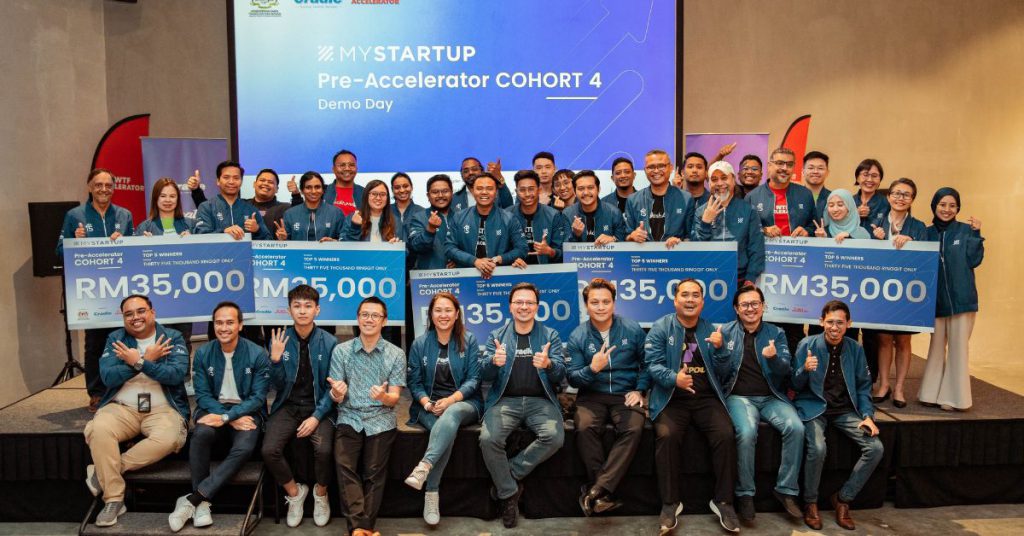
[Written in partnership with publiCT.io, but the editorial team had full control over the content.]
MYStartup, in collaboration with Watchtower and Friends (WTF), has launched the fifth cohort of its MYStartup Pre-Accelerator programme, with applications now open.
The programme aims to discover and nurture early-stage startups across the country, especially those bringing tech-driven solutions to the table.
Applications for cohort 5 are open from now until November 6, 2024, for pre-seed and early-stage startups from various sectors.
A four-month journey for founders
Running from October 2024 to February 2025, the pre-accelerator programme is designed to give founders the practical knowledge and resources they need to accelerate their startup’s growth.
Over four months, selected startups will benefit from top-tier mentorship, access to key resources, and a curriculum that hones both business and innovation skills.
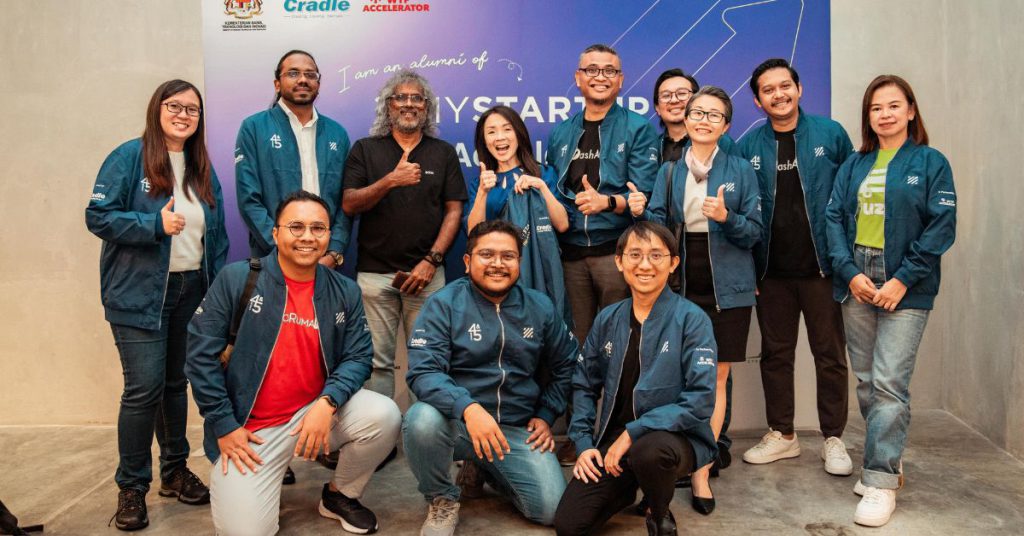
But it’s not just about knowledge. The cohort is all about results. The programme includes hands-on learning that focuses on areas crucial to startup success, including market validation, MVP (Minimum Viable Product) development, and effective pitching strategies.
At the end of the programme, the top five startups will secure a coveted spot in an exclusive fundraising accelerator programme. This step is designed to give these startups the connections and tools they need to raise investments and grow beyond the pre-accelerator stage.
As an added bonus, cohort 5 also offers prizes of RM35,000 for each of the top five startups, underscoring the commitment to fostering startup growth in Malaysia.
What you need to apply
The programme is particularly focused on tech-driven startups that offer innovative, cutting-edge solutions across a wide range of industries.
Applicants are expected to demonstrate a solid concept or prototype, with a strong preference for those who have already developed a minimum viable product (MVP). Additionally, startups must present a compelling unique selling proposition (USP) that clearly highlights the distinct value and benefits their venture brings to the market.
Here are the application requirements:
- At least one team member must commit to attending the entire programme.
- You’ll need to either have a registered business or plan to register one within the next three months.
- Startups must be, or plan to be, registered in Malaysia to qualify.
- Your team should have at least two members, with one co-founder working full-time on the business.
What you’ll learn
The pre-accelerator is structured around six core modules, which provide a comprehensive overview of what early-stage startups need to know.
The modules cover the following topics:
| Module 1 | Founders’ foundations | Establishing co-founder alignment, defining vision and mission, and goal-setting through OKRs (Objectives and Key Results). |
| Module 2 | Business model canvas | Building robust business models, customer profiling, and understanding market landscapes. |
| Module 3 | Minimum viable product (MVP) | Designing and launching MVPs with a focus on iterative development. |
| Module 4 | Market validation | Conducting customer validation, gathering feedback, and refining the product. |
| Module 5 | Early-stage essentials | Covering legal documents, valuations, fundraising strategies, and pitch preparation. |
| Module 6 | ESG for startups | Exploring the importance of environmental, social, and governance (ESG) criteria and aligning with sustainable practices to attract investors. |
This specific curriculum ensures that startups are ready to take on the competitive landscape and scale their ventures.
Building on success
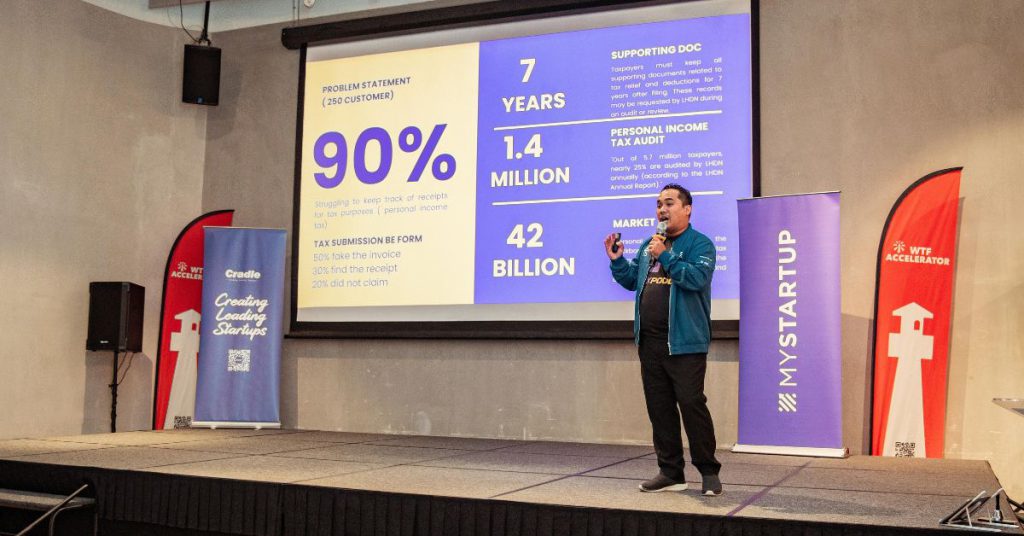
An initiative under the Ministry of Science, Technology, and Innovation (MOSTI), the MYStartup Pre-Accelerator Programme has become a cornerstone in Malaysia’s startup ecosystem.
It offers a solid platform for early-stage companies to evolve their ideas into market-ready solutions, all while fostering innovation and entrepreneurial spirit.
The programme has seen its fair share of success stories. In previous cohorts, startups like Faradays Energy secured a Cradle grant to develop a rural electrification project, while Reyhut landed a five-figure investment from a venture capital firm.
If you find this programme appealing, you can visit the accelerator’s official page for further information and apply before the November 6, 2024, deadline. It could be a valuable opportunity to advance your startup.
- Learn more about MYStartup Pre-Accelerator Cohort 5 here.
- Read other articles we’ve written about Malaysian startups here.
Also Read: SDEC 2024 will explore the latest trends in semicon, AI & ecommerce, here’s how to join
Featured Image Credit: MYStartup
This Melakan blew all his money to sell coffee out of a Mercedes, now he runs a physical cafe
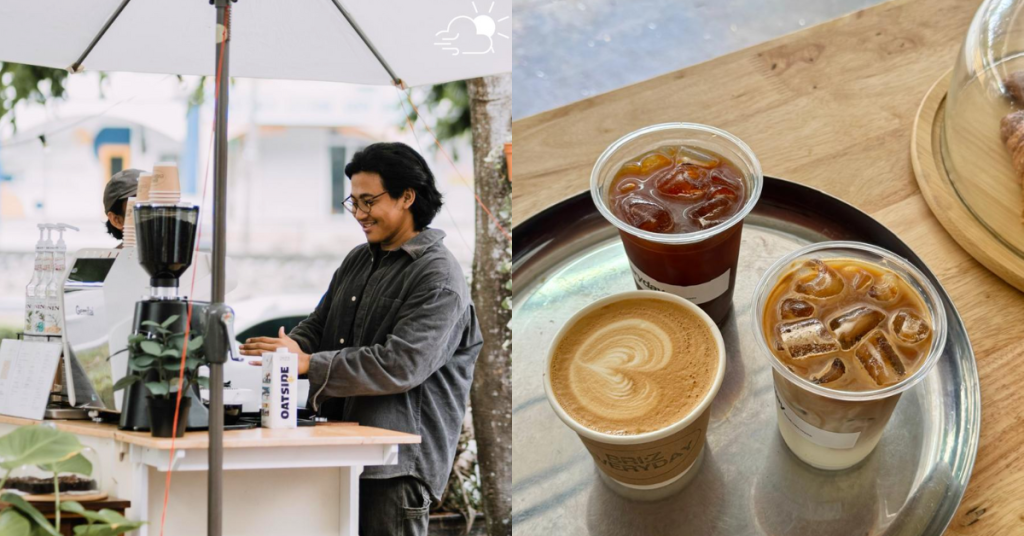
While I’m based out of the Klang Valley now, I’m a very proud Melakan kid and am always thrilled to learn about interesting businesses in my hometown.
Recently, I came across a business called Bri:z Everyday. Just minutes away from my childhood home, it’s a quaint cafe serving up speciality coffee and pastries.
Reaching out to the cafe, I learnt that it’s run by Muhammad Abid Jeffry, who obtained his food service diploma at UITM. After that, he worked at The Coffee Bean & Tea Leaf for almost two years.
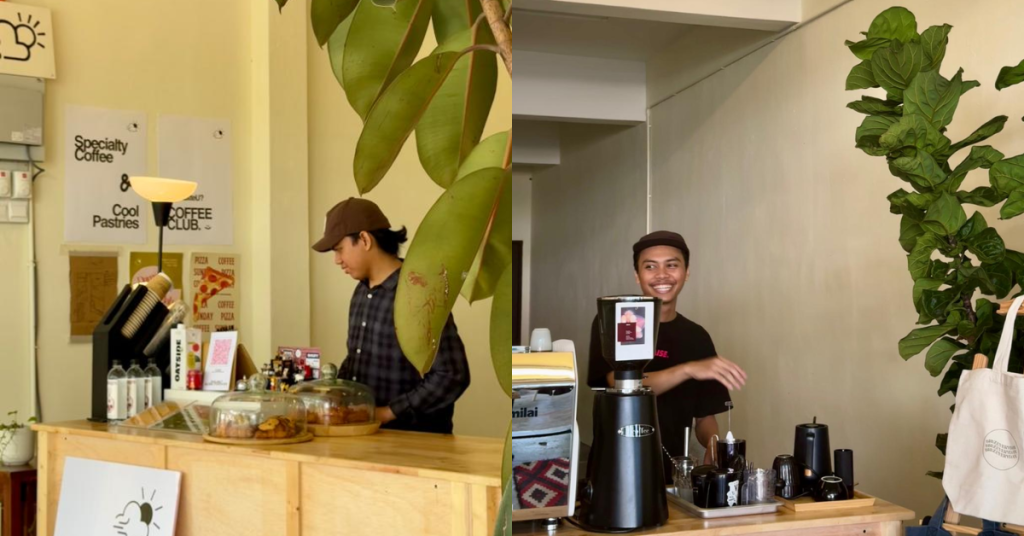
Interestingly, venturing into coffee wasn’t really his plan, though. In reality, he had wanted to continue on a more culinary path, but during his internship, he was assigned to work at the coffee bar.
During this stint, he ended up having to manage a booth selling coffee outdoors by himself, which was when he realised that he could start his own brand, too.
That’s when the concept for Bri:z got its start.
Many obstacles in the beginning
Abid’s always been exposed to entrepreneurship, in a way, as his parents own a few businesses, mostly in the education industry.
A kindergarten that they owned happened to be located in Bukit Beruang, next to a shop lot where Abid really wanted to base his coffee business. At the time, though, it was occupied. So, he set his sights on the empty roadside spot across the road.
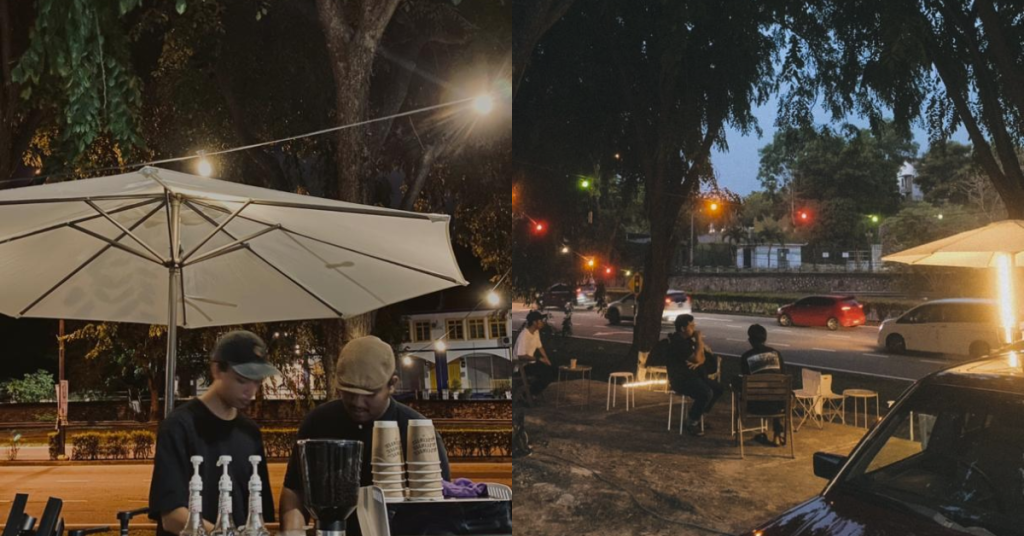
There was someone else running a business there too, with the usual plastic chairs and tables set up. Abid felt like they weren’t operating it to the site’s full potential, so he reached out and suggested running a coffee booth with his own brand. Sadly, they rejected him.
So, patiently, Abid began to wait. And after a year or so, he finally got the opportunity to start a business in that exact spot in Bukit Beruang.
An opportunity to give others opportunities
Speaking to Abid, it’s clear that starting Bri:z isn’t just about making profits for himself. Rather, he’s the kind of person who enjoys using his own abilities to help others.
A motivator for starting the business was to help his family members.
“My parents are still working to support our family. I have siblings who just entered their tertiary education too,” he explained.
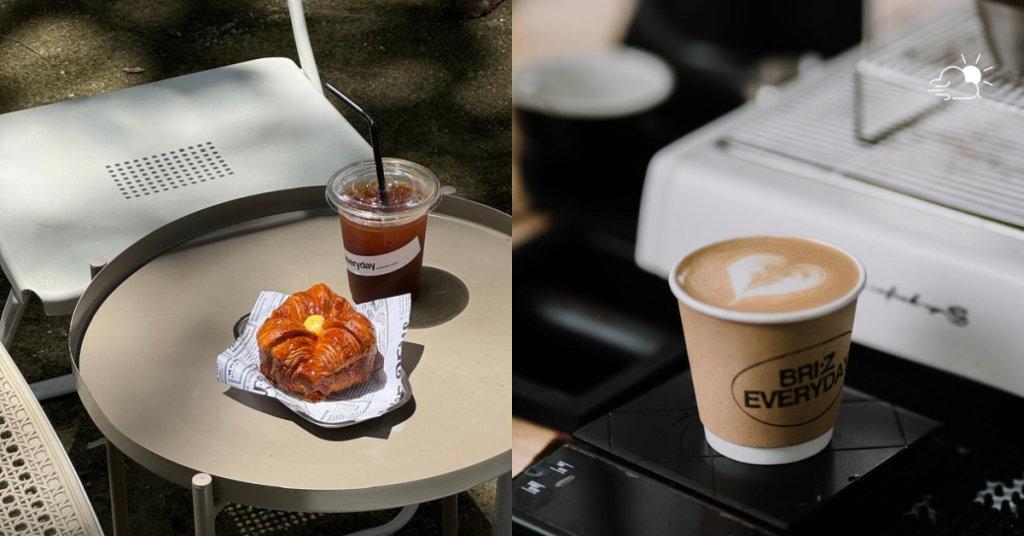
But his parents actually weren’t completely in on his entrepreneurship journey at first, as they wanted him to continue his studies. When he spent all his bonus to buy his coffee machine, his parents didn’t speak to him for a day.
He admitted that he would also put all his income into the business, even till today.
Filled with that fiery entrepreneurial spirit, though, Abid persisted and created his own business plan and proposal to show his parents.
That said, his parents ended up supporting his dreams, too. For one, Abid started out operating his coffee business out of a Mercedes E220 W124, which his father originally bought for around RM5k.
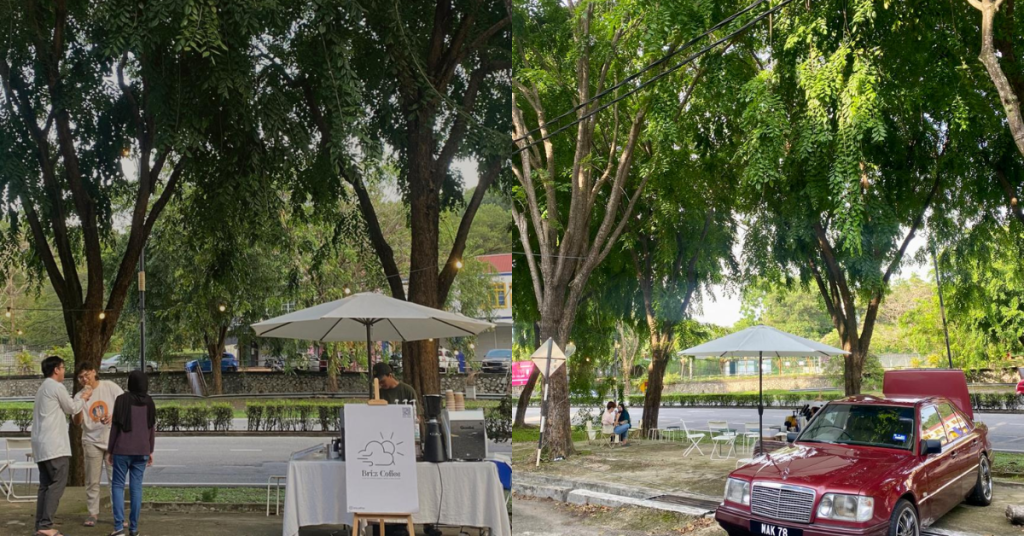
And now, his father would show up all the time at Bri:z to support the team and sometimes help out.
Meanwhile, his mum was the one who gave him his business name. Pronounced as “breeze”, it was inspired by the year Abid spent unable to set up shop.
During that year, in the empty tapak where he wanted to set up shop, Abid would park his motorbike and would just look at the trees. For one year, he did that and manifested the shop of his dreams.
And like that, the year passed by like a breeze, and Abid opened up Bri:z in May 2023.
One step at a time
Aside from family, another reason Abid felt encouraged to open a business was to help his best friend.
“I felt like he was wasting his potential, so I was like, ‘Eh, engkau, ikut aku la’,” he shared.
Together with his friend, they even built their own table out of wood, using a small saw to create the cart for their business.
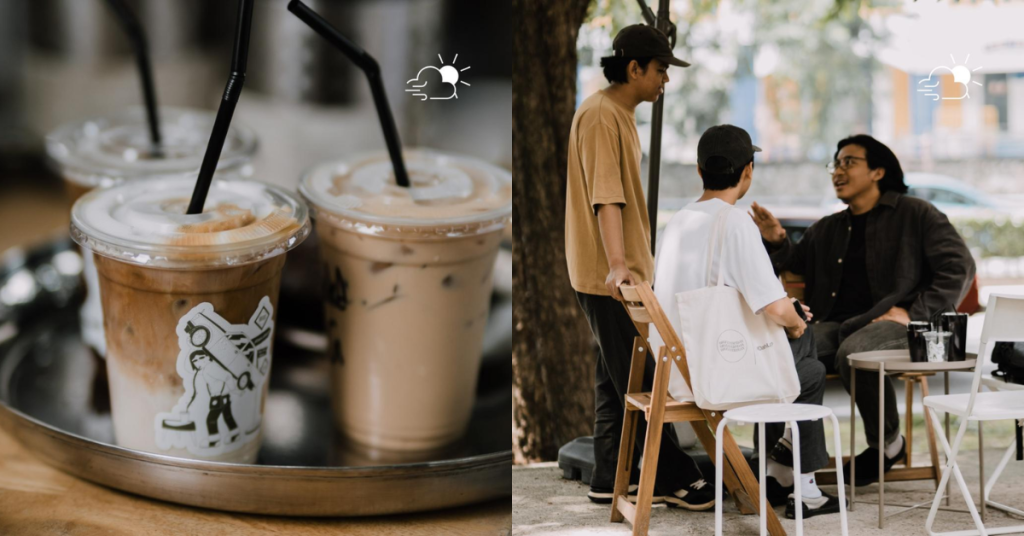
So, they went from running the business from a car boot to having their own cart.
And now they have their own brick-and-mortar store in the shop lot he always wanted.
Today, Bri:z is run by a small team of three, including Abid, his friend, and a head barista.
They actually managed to secure some financing from the government through a Malaysia MADANI programme and aim to renovate the store within the next couple of months.
Bri:z has even grown to another brand, Sage by Bri:z, which is more of a concept for events and catering services.
Abid decided to create a different brand so he could keep the identities and concepts separate. This is because offerings for events would typically differ from what Bri:z sells day-to-day, as it’s sometimes catered to specific events.
Bringing a new culture to Melaka
The cafe culture in Melaka has definitely been growing steadily over the years, even in Bukit Beruang itself. With that in mind, how is Bri:z maintaining a competitive edge?
“Why does Bri:z stand out?” he mused when asked. “Entahlah.”
Abid went on to elaborate that there’s likely a myriad of reasons. Over the course of the past year and a half, the coffee business has become a communal space for the neighbourhood.
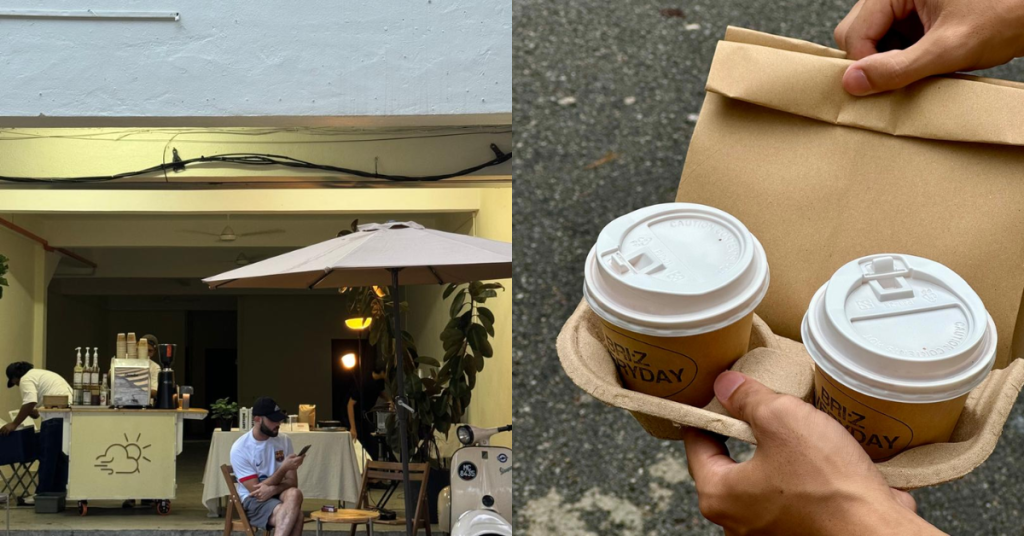
Just a few months into opening the business, Abid noticed that it had become a place for people to meet up. “Not to borak about business or insurance, but for people to lepak after a long day.”
The cafe’s operating hours, from 10AM to 11PM, both cater to and capitalise on that audience.
“We don’t focus on attracting customers from far away, but cater to those in the community,” Abid elaborated.
That said, they do hope to expand in the future to other areas in Melaka. For now, though, they want to push for community events so there’s something new to experience.
An example is pop-up markets, which are still quite rare in Melaka. Last month, he hosted a thrift event.
“With just three to four manpower, we manage to host a sizeable pop-up market,” he said.
He’s also organising a bar takeover whereby a barista will come with speciality beans, offering drinks in their own style.
While Abid doesn’t think that Bri:z is necessarily being a trendsetter, he does agree that most people in Melaka haven’t been exposed to these kinds of events yet, or perhaps do not have the opportunity to frequent them.
That’s why, as much as Bri:z exists to support himself, his family, and his friends, it’s also about helping all Melakans.
“I want to give something to the community,” he shared. “Itu je.”
Also Read: 5 scenarios in which you would appreciate having the reliable ASUS Vivobook 16 for work
Featured Image Credit: Bri:z Everyday
How M’sia’s Eco-shop plans to grow beyond 300 stores while still keeping prices at RM2.40
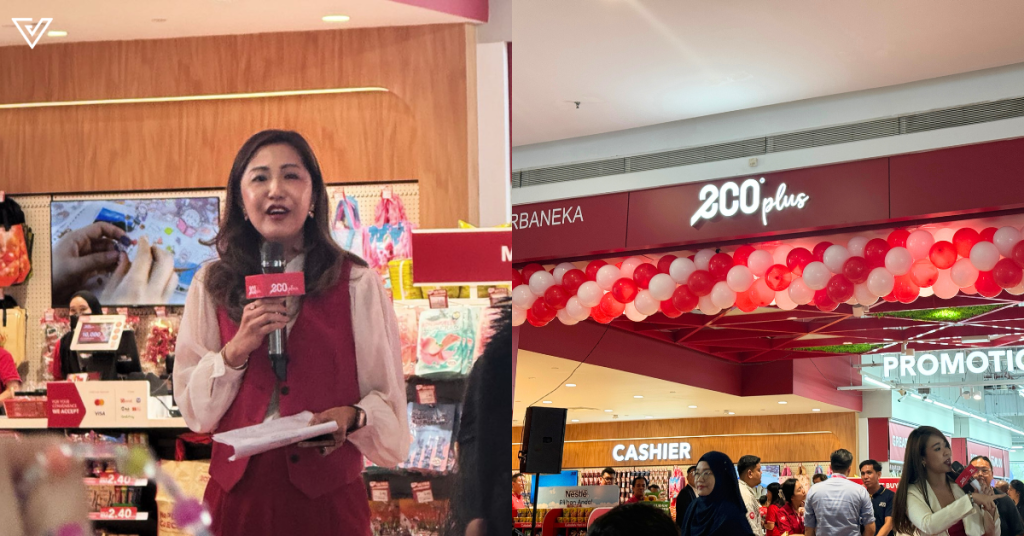
Growing a business to 300 outlets is nothing short of an incredible feat. And that milestone is something that homegrown retail chain Eco-shop has just achieved with their new concept store in Nu Sentral.
At the launch of its new outlet, we got to chat with Eco-shop’s CEO, Jessica Ng. She joined the company May of last year as the COO before stepping up as the CEO in October 2023.
But the history of the homegrown brand goes way back before her career there.
Eco-shop got its start 21 years ago when founder Dato’ Sri Lee Kar Whatt established the first outlet in Jementah, Johor.
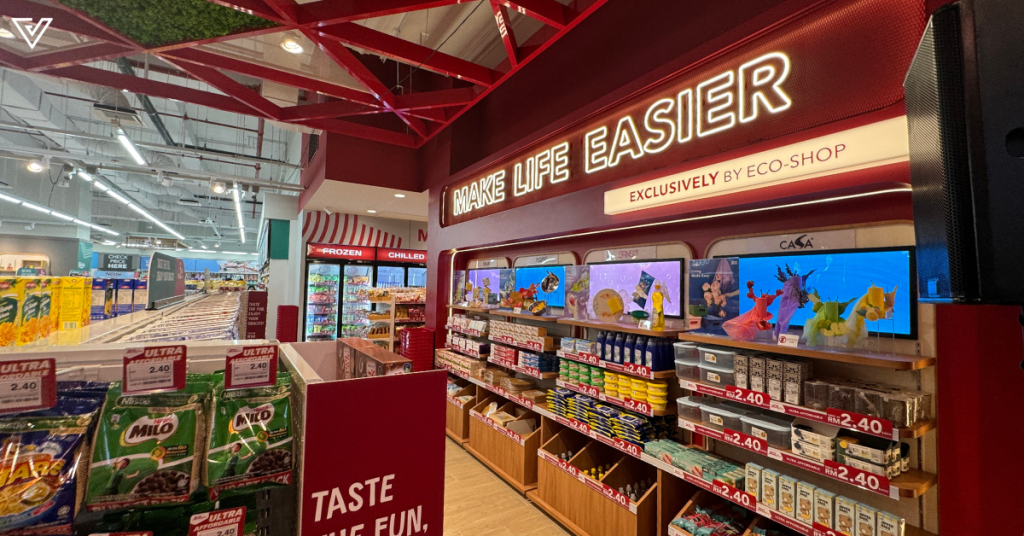
With a motto of “make life easier”, Eco-shop exists to provide ultra-affordable options for consumers, from daily essentials like detergent and tissue papers to lifestyle products such as toys.
And all of this is offered at the low, standardised price of RM2.40.
Moving into the cities
Interestingly, even though the business has an impressive store count of 300 outlets, I was surprised to learn that some of my friends have never heard of the store.
This might be because of Eco-shop’s target market, and the fact that they’ve been focusing more so on rural areas, compared to the city centre.
“The store’s business objective is to support the daily life of B40 customer base,” Jessica pointed out. “And as we grow, we’re moving more into corporatisation, we do feel that there’s a lot of opportunity to revamp the store and bring it into the city centre.”
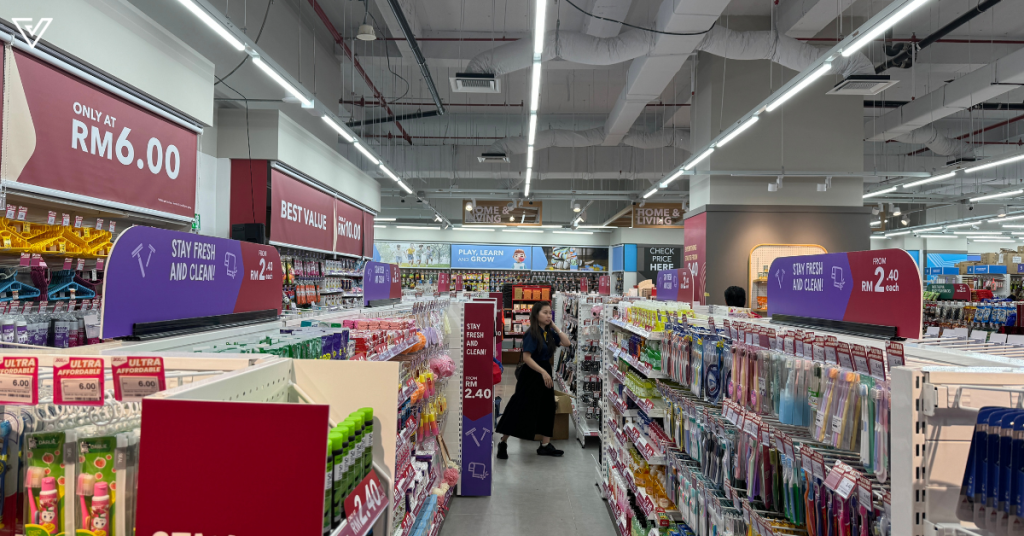
Jessica herself shared that the brand awareness for Eco-shop indeed is on the lower end in the city, but that’s something that they aim to change.
After all, many in the city also need affordable options nowadays. And the Nu Sentral location speaks to that. Being connected with KL Sentral, this mall sees huge volumes of foot traffic every day from commuters as well as tourists.
Moving forward, Eco-shop does plan to put more effort into opening up in city areas, though the majority of their stores will still be based in residential areas.
“We’re very cautious, we will look at the fixed costs, the rental that we can afford, so there is a certain benchmark of rentals that we look at,” Jessica said about their strategy towards opening more outlets.
Through store mapping exercises, the Eco-shop team aims to open up in “green areas”, which are regions whereby they do not have a presence.
Keeping prices low
Even amidst rising costs of living, Eco-shop has been able to keep its prices low, even though the RM2.40 price has been increased from RM2.20 in the past few years.
So, how are they able to do that while still sustaining and growing their business?
“I think it comes back to the totality of the value management, the value chain management,” Jessica said.
To start, Eco-shop is based outside of the city centre, including its HQ and warehouse. This helps to keep some of the overhead down.
With 300 stores, the business is able to achieve economies of scale, buying things in large quantities, which means the cost is lower per product.
On top of that, Eco-shop also breaks down certain bulk products into smaller portions and puts them into their own packaging, so the customer can afford it.
For example, while shopping for instant coffee, I noticed that they were selling instant coffee sachets in packs of just two or three, which isn’t a bad deal at all if that’s what you can afford.
As Jessica said, it comes down to “the discipline of the management, how we drive the cost efficiency, and the collaboration with the supplier”.
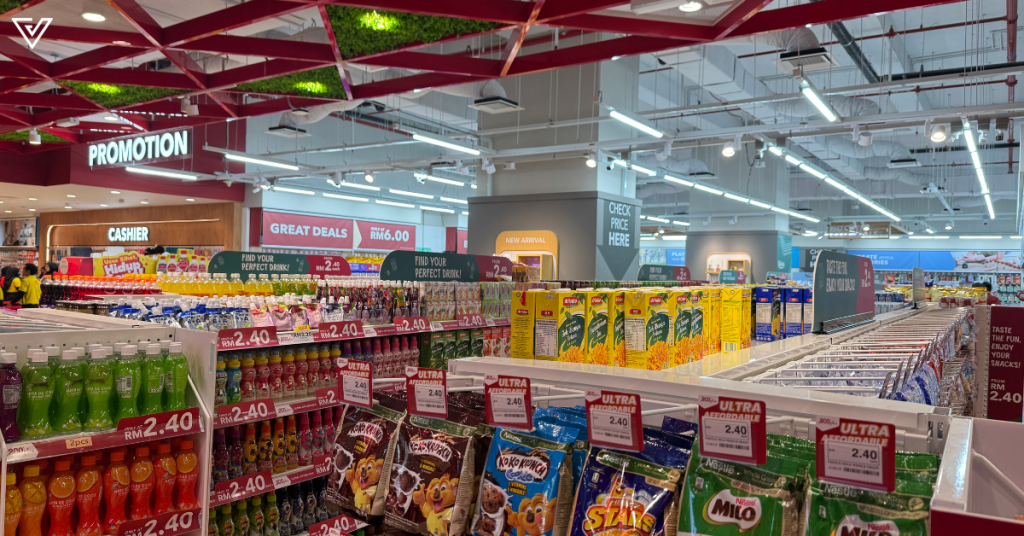
Eco-shop has also developed their own in-house brands, such as their own stationery line and even tissue line. They do this by going directly to the factory and working with them to customise products.
And going down the value chain, the company also has their own delivery fleet.
“Every component that is integrated in the company is created in a way that it needs to drive value,” Jessica reasoned.
Moving forward, Eco-shop aims to continue working with local suppliers as well as support SMEs who may have relevant products.
Still plenty of room to grow
Speaking to Jessica, it’s clear that Eco-shop is very positive about their future in the Klang Valley.
“I think there are many, many shops that we can open,” the CEO said.
But instead of just blindly opening more outlets, they must ensure that they have the resources to support those stores, especially when it comes to labour.
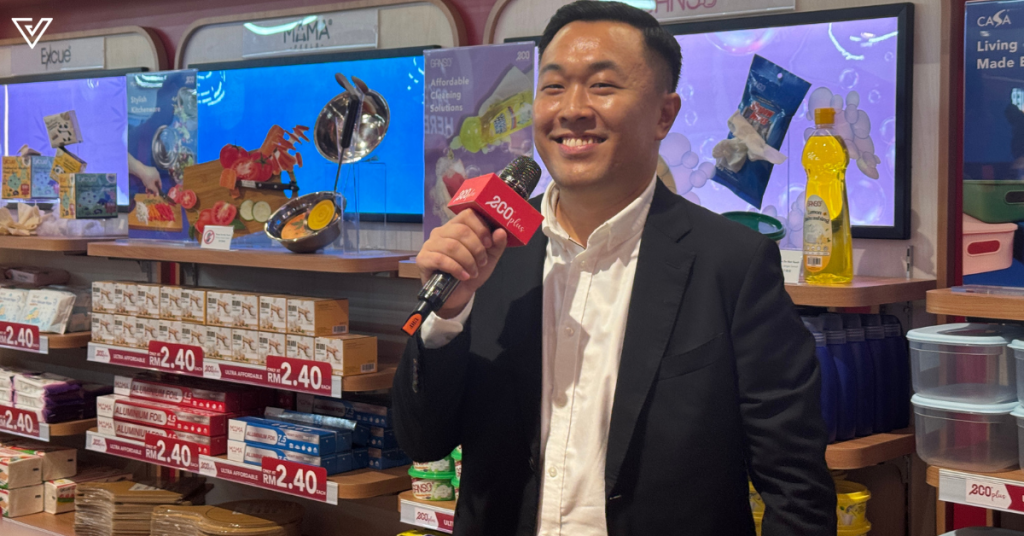
“Many times, retailers grow very fast but you don’t have the manpower in place. So, for us, we set up around seven satellite training centres to groom the storefront people,” Jessica said. “That will help us support another 50 to 60 stores in a year.”
With how much Eco-shop has grown, I wondered whether they would be setting their sights abroad in the near future.
“At this moment, I think Malaysia still has a lot of room for growth,” she said. “There’s still a lot of places for us to open stores, so we would like to be more focused and do a very good foundation in Malaysia.”
Also Read: SDEC 2024 will explore the latest trends in semicon, AI & ecommerce, here’s how to join
Featured Image Credit: Vulcan Post
Starting with just RM2K, this roadside taco stall now has grown into a brick-and-mortar store
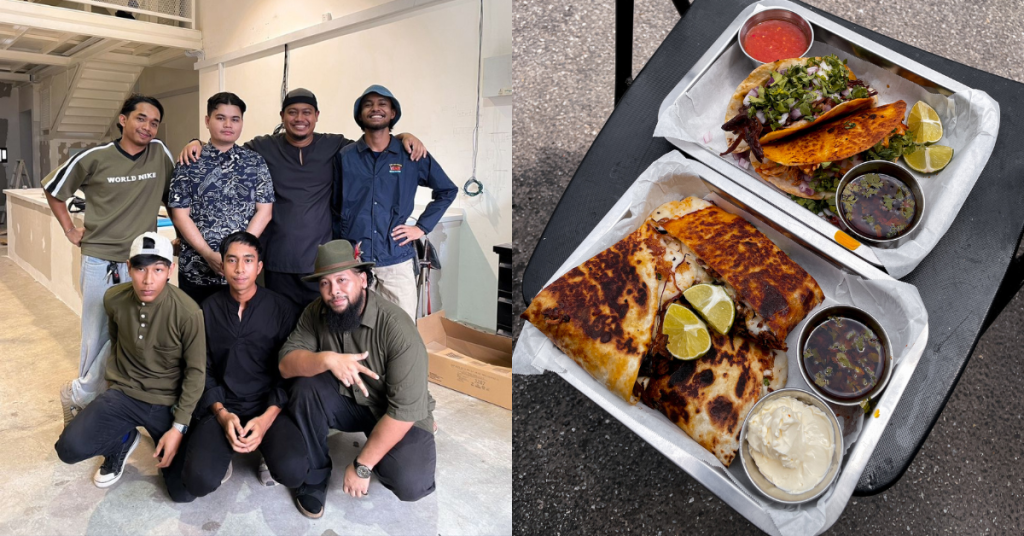
Over the years, the Klang Valley’s food scene has grown to be a melting pot of different concepts and cuisines. From KBBQ to Southern food, there’s a lot of specialist restaurants now offering unique dishes.
One cuisine that has been on the rise is Mexican fare, and one spot specialising in Mexican birria tacos that have popped up is Comienzo, which was previously known as Los Primos Locos.
Addressing a market gap
Director Muhammad bin Harun is joined by two other founders, Nasruddin and Farid, both of whom are serial entrepreneurs with other businesses. Namely, Nasruddin runs a travel agency and Farid owns a gym. Together, they also own a joint business, Kopimanual.
As for Muhammad, he used to work in a Seksyen 9 restaurant and as well in Bukit Jelutong whilst running his own taco stall at that time.
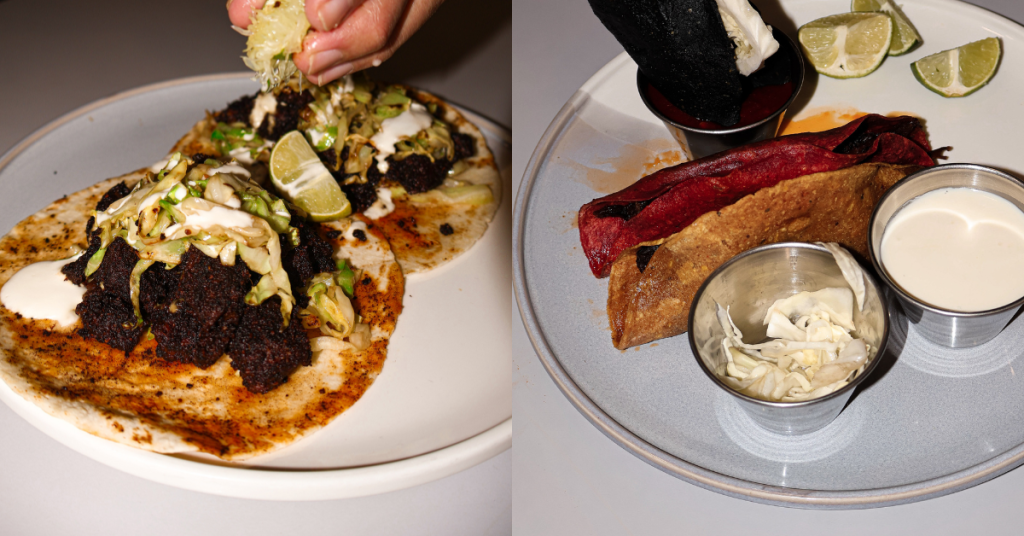
“I noticed if we want tacos, we have to go to either Chica Bonita, Chili’s, etc., but most of these restaurants have alcohol, and majority of Malaysian are Muslims,” he pointed out.
With that realisation, Muhammad didn’t hesitate to start whipping up tacos. He started it with his cousin using a humble capital of RM2,000, more or less.
That figure and commitment might sound crazy to some, which is why they called the business Los Primos Locos, meaning The Crazy Cousins.
As crazy as it sounds, the love they had for the business made it all worth it. “When you have the drive, the passion to wait eight to 12 hours until the meat is tender, and getting positive and the love from the community, that’s love.”
Established in September 2021, the business remained as a roadside stall for around two years.
Till today, the brand’s menu items, especially the spices for the birria, are all made in-house.
“We’ve received lots of positive and advices from Mexicans on what to improve more on our salsas, and how to do it,” Muhammad said. “They helped us a lot and we are humbled for it.”
From roadside stall to a brick-and-mortar
While Muhammad originally started the taco business with his cousin, the idea for Comienzo was created by Los Primos Tacos along with Nasruddin and Farid’s Kopimanual.
“Both companies had the same dream of opening our own restaurant,” Muhammad explained. “So, one day we sat down together and we talked about being partners in business.”
Setting expectations upfront, the trio split up their roles, with Muhammad taking on the duty of being at the restaurant every day—even on off days to prep—while the other two focused on finances, accounting, and other admin work.
While the roadside stall was originally stationed in Seksyen 7, Comienzo has set up shop in Eco Ardence. They were a rather established brand back in Seksyen 7, often selling out even before the day ended. So why move away?
“We decided to move to Eco Ardence as it was a good location for us,” Muhammad said, referring to him and his partners.
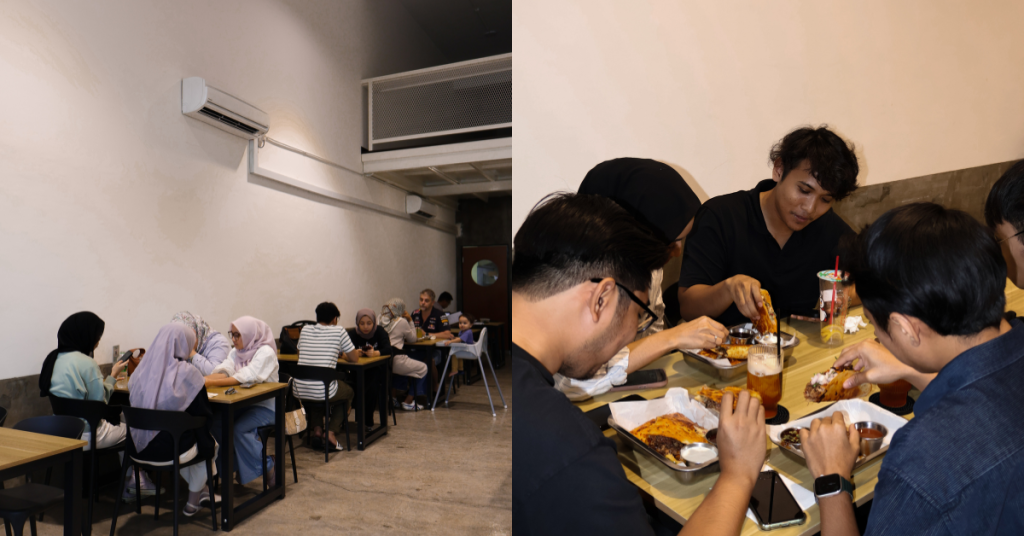
Initially, he wanted to go for Seksyen 9 or Bukit Jelutong, two places he has worked at before. But due to timing constraints, they settled on Eco Ardence.
Regarding the name, they decided to come up with a new one, Comienzo. The word means beginning, signifying the start of the new partnership and, hopefully, a long journey to come.
From roadside to brick-and-mortar
Going from a roadside stall to a brick-and-mortar store is pretty different, though. Muhammad shared that it has been quite a big challenge, and came with its fair share of surprises.
That said, he’s worked in restaurants and cafes, and had the opportunity to learn from and ask the owners how they manage the staffs and finances.
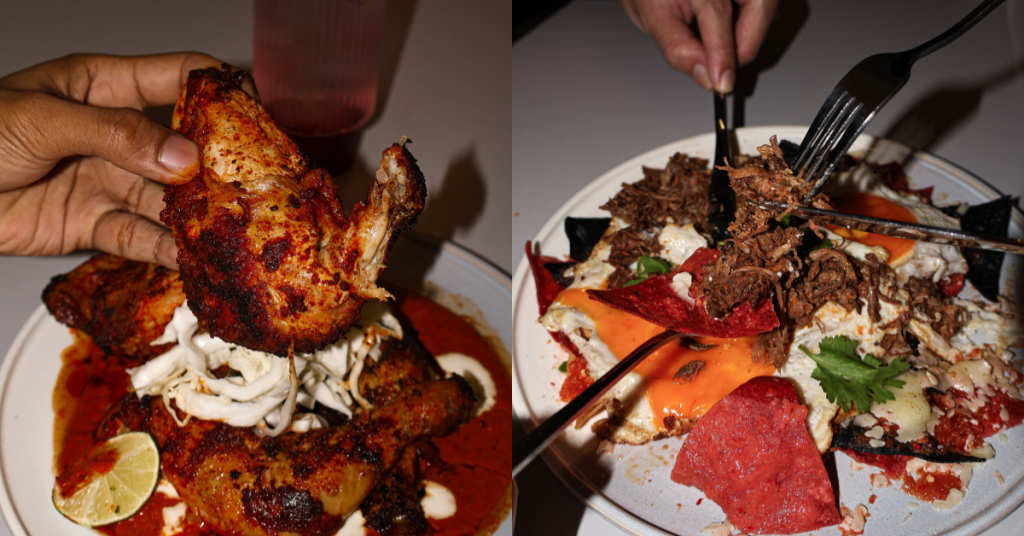
But the main challenges he faced weren’t so much about expanding into a physical outlet, but working with external people.
“The challenge for me was when two companies collaborate and the staffs have never worked together, there will be times when there’s a tense moment,” Muhammad explained. “Even amongst the partners, sometimes there can be a clash of ideas.”
The only way for them to overcome the problems, he learnt, is through communication. As such, the teams hold many staff meetings to go over things that can be improved. Even amongst the partners, they would endeavour to come to a neutral conclusion so that everything can be smooth sailing.
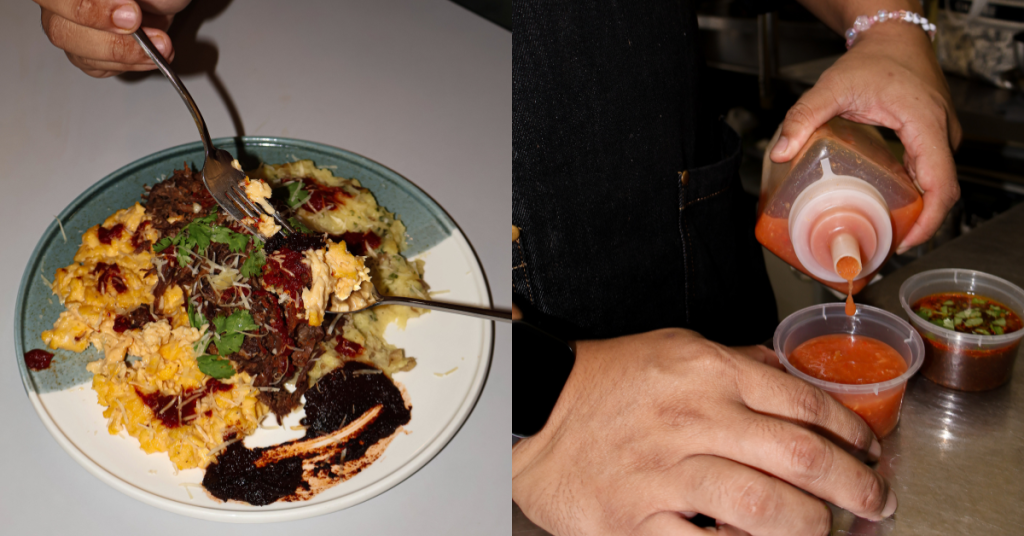
In any case, there seems to be no regrets about going from a roadside store to running a physical outlet. Muhammad recognised, though, that opening a physical store might not be for all roadside entrepreneurs.
“It actually depends on the individual,” he said. “Some can move forward when they open a brick-and-mortar store, but some become stagnant and later would close their doors.”
He himself had this fear too when opening Comienzo. But looking at his staff who tirelessly set up the tent and brought down the griddle from the company’s van almost every day, he convinced himself that it was time for some change and growth.
Growing with the market
Having been running his own birria taco stall for about three years now, Muhammad believes that things have changed in terms of the F&B scene in Malaysia.
“I can see that people are no longer afraid to try something out of the norm, and it should be like that,” he said. “Especially in places we would consider as outside of the city or suburbs.”
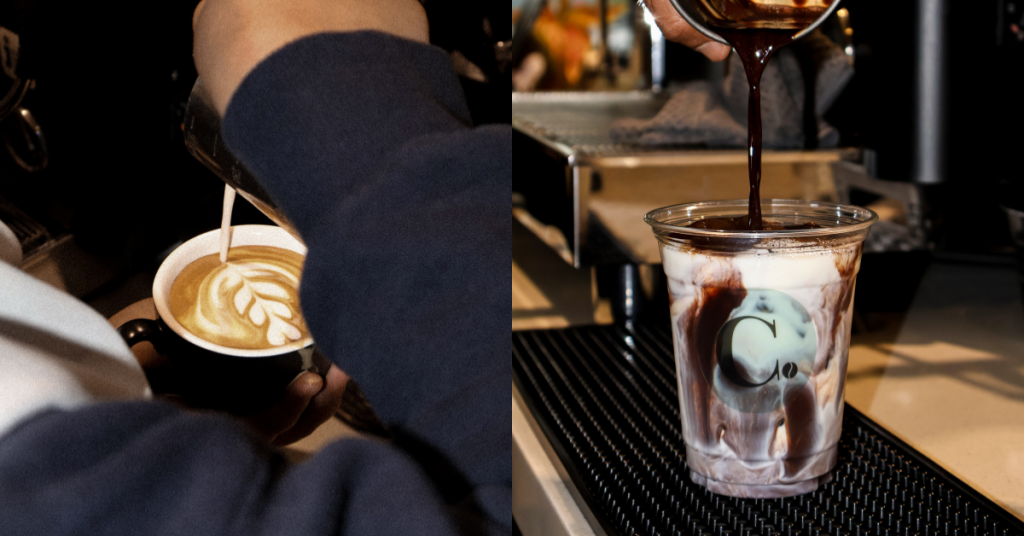
Areas like Petaling Jaya and Bukit Jelutong are now home to many F&B spots, from artisanal bakeries to coffee shops, and these places would often be packed with people.
“I pray for younger chefs and entrepreneurs to express more and bring in more new ideas, creating a new canvas to the F&B industry,” he said. “As the world is moving forward, so is our industry. Even though we might be a little bit behind, I know one day we can catch up with other restaurants/cafes outside of Malaysia.”
With that said, Muhammad seems to have bold plans to grow Comienzo to more outlets, and maybe one day, even venture abroad.
- Learn more about Comienzo by Los Primos Locos here.
- Read other articles we’ve written about F&B businesses here.
Also Read: SDEC 2024 will explore the latest trends in semicon, AI & ecommerce, here’s how to join
Featured Image Credit: Comienzo by Los Primos Locos
